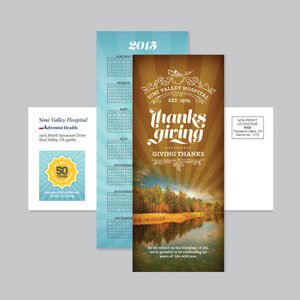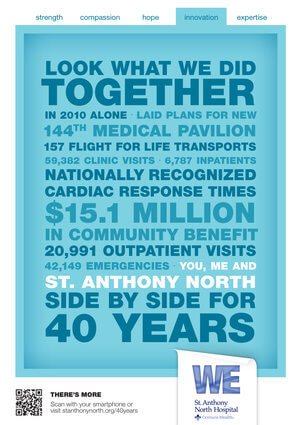“Remember to celebrate milestones as you prepare for the road ahead.”
COMPANY MILESTONES CAN TAKE DIFFERENT FORMS. They can be an anniversary of your opening, the launch of a momentous new offering, or a turning point in your company’s history.
Because they offer a platform to get attention, they shouldn’t be seen as just a chance for a party. With careful thought, they can provide business value and a chance to deliver important messages.
Here’s what a strategic approach to celebrating a milestone or anniversary can do for you.
Click on the play button to watch the sample milestone video above
Energize your team
Your people have likely been working hard to get you to this milestone. They may have been laser-focused on reaching it and desperately in need of a win. Celebrating milestones does for companies what a win does for your favorite sports team: it energizes and re-engages the fans. It lifts the collective spirits of the team, which impacts how they work, how they interact with teammates, and how they treat customers.
Revisit Your “Why”
A close relative of celebrating the win is the chance to shine the light on the “why” that fuels your work. In the same way that a win energizes your team, a sense of purpose engages them. And since only about one-third of America’s workforce is engaged at work, a powerful presentation of your “why” can motivate your team to do their work better. Milestones and anniversaries present the ideal time to do this.
Create Momentum
A milestone or anniversary signals success, which has a halo effect. It’s easy to conclude that if your company has been successful up to this point, then success must be in your future, as well. Celebrated with this in mind, a milestone can become fuel for future wins.
Recognize Effort
Recognition is vital to engagement. Celebrating a milestone or anniversary is a perfect time to harness the power of recognition that creates stronger ties with the people you count on—employees, donors, volunteers, and customers.
Cast a Vision
Celebrating your milestone or anniversary provides a platform for casting your vision for the future. Besides celebrating success, you now have the eyes on you and can deliver strategic messages that will inspire support.
get noticed
Significant milestones or anniversaries make news and get your story in front of more people than you might normally reach. Capitalizing on this gives you another opportunity to get media attention and to be seen and heard.
Reinforce Your Culture
The ideas that got you to milestone or anniversary are important. Reinforcing them at a time like this gives people more reasons to connect with your company and resonate with your values and mission. Those who know your story will have a chance to re-enter it; those who don’t, can experience it for the first time.
your contribution message
Most of your marketing campaigns are focused on a product or service, and don't leave room for the contribution message. Milestones or anniversaries are the perfect place to unpack how you're giving and supporting your community or industry.
THERE’S NO RULE ABOUT WHICH MILESTONES YOU SHOULD CELEBRATE. Whenever you have a story to tell, however, a milestone or anniversary gives your message immediacy—which makes it more likely to get traction.
THE MOST IMPORTANT REASON to invest in celebrating a company anniversary or milestone is to use it as a platform to tell your story and energize your supporters. Here are some ways you can tell your story.
1
Use your own spaces to tell your story
Why shouldn’t every person who enters your facility be met by your story? Since there are no media buying fees, this is an affordable option that reaches both your external and internal audience. Consider:
Window signage
Screensavers
2
Create new events and use existing
events to tell your story
You already have standing events internally—so why not bring your milestone or anniversary story into them? Show your video, bring your pop-up banners, and share printed material at your:
Employee forums
Team meetings
Community events
Company picnics, parties, or barbecues
3
Create a digital landing page
Dedicate a web page to your milestone messages, complete with timelines, video, and content about your successes.
This can be on your existing website or a freestanding digital landing page that links to your website. It should be where you point all digital traffic to so you can track your analytics.
4
For major milestones, create a digital or print history brochure or book
Sharing your history isn’t about dates, but about showing how your company has faced and overcome challenges, handled pivotal moments, and built successes. Revisiting these reveals how your mission and values have driven your organization in the past, and offers wisdom for the future. See examples here.
5
Create a Video Strategy
A video strategy should include determining the type of videos you want and how you plan to distribute them. Here are a few ideas for milestone or anniversary videos (see more below):
Celebration video that showcases successes.
History video that shows the growth and struggles of the organization that have led to this moment. This can be a longer narrated or interview-driven video, or a short motion graphic, depending on the goals.
Interviews with historic voices.
6
Create some versatile
communication tools
Create a milestone or anniversary icon to use on social media and promo materials.
Create a business card that says “Thanks for being part of our story" and can be used to drive traffic to your landing page.
7
Provide story ideas to
your target audience media
Look for fresh angles that connect to your specific audience.
8
Create a social media campaign
that engages your audience
Create a calendar of posts that unpack your key messages.
Use shortened clips from your videos and other communication content as social media posts.
Have a photographer and videographer at key events to create social media content.
9
Give back
Adopt a local cause for a year.
Sponsor a charity.
Sponsor a community event that reflects your values.
10
Say thanks
Find ways to thank the people who were behind the success, like:
Writing personal note cards to clients, donors, and key employees.
Giving exclusive gifts to major contributors.
Honor key people at events.
ONCE YOU’VE DECIDED TO CELEBRATE your milestone or anniversary, here are the first things you’ll want to do.
1. identify the business goal you want to achieve
You don’t need another event to plan, another communication plan to make, unless it is going to advance your strategy or align with your values. So be clear on this from the start, and make sure you have buy-in from all of the key players who will be needed to make this successful.
2. Create a plan, budget, and timeline
Sometimes your administrative team will ask you to propose a budget, or sometimes they will give you a budget in advance. If you’re proposing a budget, linking it to a compelling business strategy and desired outcomes can help you obtain funding. You can download this editable plan as a starting point.
3. Identify your team
Who needs to be involved in the planning—and at what phase? Leaving out critical team members, like security, for example, can create internal chaos, so don’t shortchange yourself at this step. Teams that will be heavily involved in the work need advance notice to provision staffing and resources.
4. Secure key dates
Make a quick check with other calendars to be sure there isn’t another big competing event happening that would impact your audience. And whether you’ll have one or several events, make sure the dates get on the calendars of key people. That list may include leaders, board members, donors, volunteers, venues, caterers, and speakers.
5. identify key messages
What are the top two or three ideas you want everyone to know when this is over? These will inform all of your communication planning going forward.
Need some inspiration?
Click here to see more samples.
SUMMARY
FOR A SUBSTANTIAL ANNIVERSARY, like 100 years, a major corporation may spend one or two years planning, while a smaller business might spend a few months. Whatever you decide, make it a celebration that infuses fun, wisdom, and gratitude into your organization.

































































